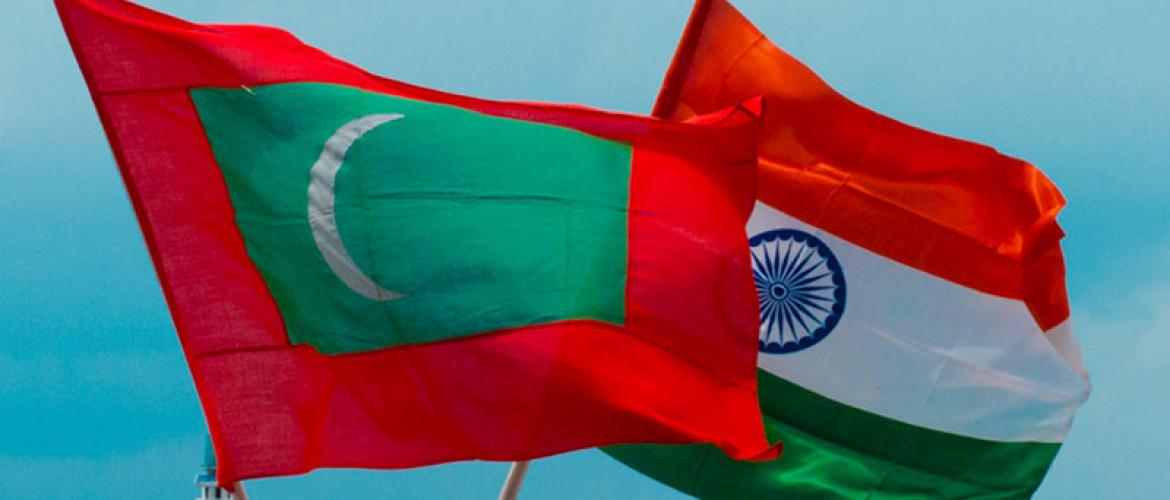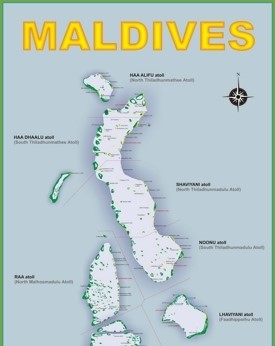The Indian dilemma
February 9, 2018 | Expert Insights

The political crisis in Maldives continues to escalate as President Yameen has refused the calls of the international community to release political prisoners and adhere to the nation’s Supreme Court ruling. Meanwhile, various factions in Maldives have reached out to India to intervene during this period of strife.
Background
The Maldives is an Islamic republic which lies off the Indian sub-continent to the southwest of Sri Lanka and India. It is made up of a chain of nearly 1,200 islands, most of them uninhabited. Only 198 of the islands that are part of Maldives have human habitation. The chain of 26 atolls stretches from Ihavandhippolhu Atoll in the north to the Addu City in the south.
Abdulla Yameen is the President of the Maldives, in office since 2013. He is the half-brother of former President Maumoon Abdul Gayoom. The first democratically elected President of the Maldives and one of the founders of the Maldivian Democratic Party is Mohamed Nasheed. In 2015, he was convicted on charges of terrorism and was sentenced to 13 years in prison after being found guilty of terrorism.
On the 1st of this month, the Maldivian Supreme Court issued a ruling stating that the 2015 conviction of former President Naseed and 8 other leaders was unconstitutional. Additionally, the court ordered the release and reinstatement of 12 opposition MPs. The situation quickly devolved into a constitutional crisis. On February 5th, President Yameen declared a state of emergency for a period of 15 days. He refused to release the political prisoners and arrested two judges of the higher court in the region.
The international response has largely been to convey support for the Supreme Court’s decision and Maldivian citizens.

Analysis
Historically, India has played a role in Maldivian affairs. In 1988, when the Maldives capital came under attack from a band of mercenaries, Indian paratroopers came to the rescue of the government and quickly restored order. India has often acted as a peacekeeper in the region historically.
The opposition parties in Maldives have officially requested India to intervene. Meanwhile, China has registered that it was against any military action from the Indian government. Yameen has now sent envoys to China, Pakistan, and Saudi Arabia. He also wanted to send a special envoy to India, but the visit was declined by the Indian government. The Maldivian islands is seen as a theatre where India, China and the US will continue to vie for influence in the Indian Ocean.
"India was, in fact, the first stop planned and proposed for a visit of a special envoy of the president of Maldives. However, the dates proposed were not suitable for the Indian leadership," Maldivian envoy Ahmed Mohamed told PTI. "We understand the external affairs minister is out of country and the Prime Minister is leaving for UAE during the week," he said.
The President has also fired two police chiefs who said they would uphold the court order to release Yameen's opponents. The army appears to be supporting Yameen. On Sunday, state television showed several police and soldiers saying they were ready to sacrifice their lives "in the defence of the lawful government". Yameen's supporters have shut down an independent television station.
The international community has strongly condemned the actions of the government in Maldives. "The US calls on President Yameen, the army, and police to comply with the rule of law, implement the Supreme Court's lawful ruling, ensure the full and proper functioning of the Parliament, and restore the constitutionally guaranteed rights of the people and institutions of Maldives," a US State Department spokesperson told PTI. The White House has also revealed that India PM Narendra Modi and US President Donald Trump have spoken to one another about the situation. Trump reportedly expressed concern over the political crisis in Maldives on phone and discussed developments in South Asia and the Indo-Pacific region.
Assessment
Our assessment is that it is clear that the Maldives’ fledgling democracy has imploded within days. There has been growing concern over Yameen's intent since he became the President. He has been accused of systematically crushing dissidence within his party and has removed rivals from the political arena. India, being a close ally, and the largest democracy in the world has remained silent to pleas for intervention. Delhi also is concerned that China may use this opportunity to increase its own influence within Maldives – this would become a threat to India. As we mentioned earlier, China has signalled that it plans on building artificial islands near Maldives and a Chinese base in the Maldives, which might upset the naval balance of the whole Indian Ocean, potentially threatening mainland India, as well as the nearby US base at Diego Garcia.








Comments